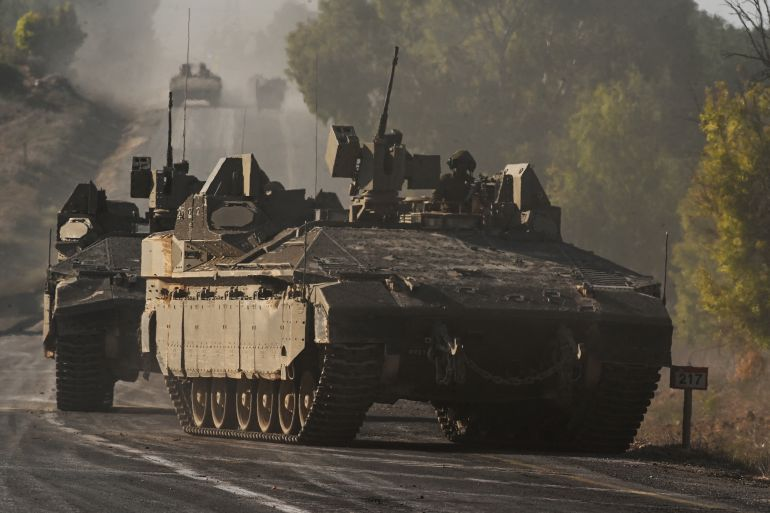
The current ominous lull might be an indication of a standoff between Israel’s civilian leadership and the military.
Nearly three weeks after the Hamas attacks in southern Israel, Israel has not yet responded with its promised ground invasion.
Initial moves after the October 7 attacks conformed to political and military logic. A national unity government was formed to demonstrate that the country is operating as one. More than 350,000 reservists were called to arms. Relentless bombing of Gaza started immediately although to this day it is hard to discern any military justification or pattern in the pounding of Palestinian infrastructure and killing of thousands of civilians.
Despite angry demands from Israeli society, especially its radical factions, for a massive response and total annihilation of Hamas, analysts, myself included, warned that preparations for a ground war take time. Realistic calculations were that Israel would be ready in 10 to 15 days. Nothing happened.
Half a million armed men and women remain positioned all over Israel and the occupied West Bank, but the momentum of war seems to have diminished, almost stopped. What happened? Why has the Israeli war machine not advanced into the Gaza Strip?
There may be many explanations, and only the Israeli cabinet and the army General Staff know them and keep them top secret. Outsiders can only guess based on scant open sources. We scrutinise bits of seemingly unconnected information for a pattern, subtle nuances in official statements, even body language between civilian chiefs and top military officers.
Reasons for the delay could be international or domestic, could be caused by civilian or military considerations.
The first possibility would be the quest for a peaceful solution. Israel could be holding out to give informal and poorly coordinated international initiatives a chance to at least secure the release of some or all captives, if not to negotiate and secure a ceasefire.
That line of thought has as little credibility as do the efforts of the international community. This is the most unlikely scenario. The determination to avenge the victims of October 7 seems so unwavering that even the pleas of the hostages’ families for them to be freed without fighting are being disregarded. Any armed hostage rescue situation could end in heavy collateral damage and captives dying rather than being freed.
If the reasons keeping Israel from launching its wrath are military, could that be an indication that the high command, known as Matkal, fears that the current forces it has at its disposal are insufficient? No, that cannot be because it could easily raise hundreds of thousands of additional trained reservists and arm them from its warehouses.
Another obstacle could be the realisation that the brigades poised around Gaza are not trained for bloody urban warfare and especially for what would certainly be the most difficult part of such a battle: subterranean fighting in the network of Hamas tunnels. That too cannot be the reason because the General Staff would have known how (un)prepared its forces are for that task on October 7 and would not have unleashed the fast mobilisation but would have first raised those units that needed specialised training.
Ominous lull
General Herzi Halevi, chief of the Israeli General Staff, and his associates must be uneasy. They have half a million soldiers getting nervous, not knowing what their task is or when and how they will roll into action.
Every sergeant in every army knows that the worst thing for military morale is uncertainty, indecision, waiting, loitering and expecting the unknown. In peacetime, grunts are made to do menial tasks just to prevent that poisonous uneasiness, but in war, it sets in and erodes fighting capabilities rapidly.
So why are the Israelis allowing their armed forces to start doubting their purpose? Everything points to discord between Prime Minister Benjamin Netanyahu and Defence Minister Yoav Galant on one side and Halevi and his commanders on the other.
Since time immemorial, officers obeying higher orders, imperial, royal or civilian, want those to be clear, well defined, without doubts and uncertainties. When civilian authorities order the army into action, they must outline the strategic goals and the fallback options if the primary goals prove elusive. Generals want their orders in writing so that after the battle, responsibility for eventual shortcomings or failures can be honestly apportioned.
In the case of Israel, the generals certainly want the cabinet to tell them what it expects the forces to do and what the politically acceptable level of losses and casualties is. It is Matkal’s job to plan for all eventualities, but it needs to be told what the policy is.
If, hypothetically, the cabinet were to say: “We want to expel all Palestinians from Gaza, kick them into Egypt,” or “We want to get into Shujaieya Park, into the centre of Gaza City, raise the Israeli flag there, stay for a month and withdraw into Israel,” the military command would calculate the force levels and composition of forces needed and get them ready and deployed. It would plan for various eventualities, from easy victory to bloody deadlock or unacceptable losses and defeat.
The current ominous lull might be an indication of a standoff between the civilians and the military. I am only guessing, but it would be consistent with Netanyahu’s cowboy style and bully mentality to try to pressure the army into action with muddled orders, something along the lines of: “Just move in, kick Hamas fighters as much as you can and then we will see how it develops.”
It would also be consistent with the mentality of generals who feel a responsibility to their junior officers and troops to resist acting on vague instructions that the military sees as irresponsible.
For all of the above reasons, these uncertainties probably cannot be allowed to go on much longer. Israel must either launch the big offensive soon or say it is postponed, possibly indefinitely.
